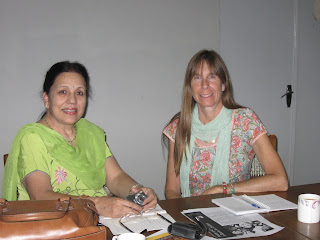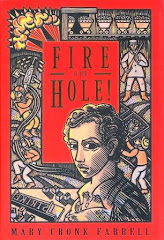
Seated with me is Ira Saxena, Secretary of the Associaition of Writiers and Illustrators for Children in New Delhi. She is also a volunteer for India's Children's Book Trust, an organization that publishes books for children in hundreds of local dialects and sponsors literacy programs along with IBBY through out India.
Manorama Jafa, the Vice President of AWIC invited me via email before coming to India to participate in their monthly meeting in which twenty or more writers attended. On this particular day, they celebrated their first Hindi dictionary for children, a book the Trust had published many years ago, but had been bought by a major publisher. Royalty checks were distributed to several of the authors who were present.
On a second visit to the Children's Book Trust, Ira Sazxena interviewed me for an article she will write for Indian IBBY Journal. Our discussion roamed from the craft of writing to the underlying theme of Sufism in my novel Anahita's Woven Riddle and our favorite translations of Persian poetry, which Ira grew up reading. Her mother translated the Sufi poetry of Omar Khayyam into Hindi. Ira, a child psychologist and children's book author is presently at work on a novel set in 1800's India with an environmental theme. "Did you know the world's first tree hugger was in India?" she said. I had never given much thought to the origins of this kind of activism and assumed it may have been in the California redwoods. I look forward to reading this novel. For more details about the Children's Book Trust, its volunteers, and my trip to India, please check out the Central Asian pages on my website www.meghannuttallsayres.com










